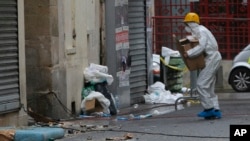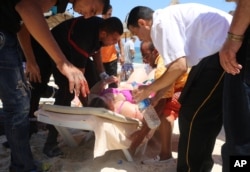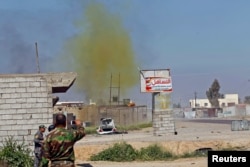European counterterror chiefs warned at a London conference Tuesday that Islamic State militants are seeking to secure biological and nuclear materials to build rudimentary weapons of mass destruction.
They said IS might be splitting into two for operational purposes, with one wing focused on defending the terror group’s self-styled caliphate straddling Syria and Iraq, and the other dedicated to carrying out terror attacks in the West.
Speaking at the Security and Counter Terror Expo in London, security officials said IS militants had shown interest in obtaining nuclear, biological and chemical material for terror attacks in the West.
“We know terrorists are trying to acquire these substances,” said Jamie Shea, deputy assistant secretary general for emerging security threats at NATO. Jorge Berto Silva, deputy head of counterterrorism for the European Commission, added that there was a “justified concern."
Summer attacks
The warning came as German and Italian intelligence officials reported their fears that IS strategists are planning suicide summer attacks on Mediterranean resorts.
The German newspaper Bild said the plans involved the use of automatic weapons on crowded beaches, similar to the shooting last June in the Tunisian beach resort of Sousse that left 38 vacationers, mostly Britons, dead. Disguised as a tourist, the gunman at Sousse, Seifeddine Rezgui Yacoubi, pulled out an AK-47 assault rifle concealed in a beach umbrella.
An Italian security official told VOA the plans involve attacks on French, Spanish and Italian beaches. “We think they are planning to pretend they are vendors,” he said.
On Tuesday, Spanish police announced they had arrested a Moroccan on the island resort of Palma de Mallorca on suspicion of recruiting fighters for IS.
Many analysts argue the chances that IS will be able to secure nuclear material for even a rudimentary bomb are small — but not zero. Over the past five years, the FBI has assisted authorities in Moldova in disrupting four efforts by nuclear smugglers to sell radioactive material to Middle Eastern groups, including IS. The Associated Press reported last year that one IS-involved deal was focused on the attempted sale of a huge cache of deadly cesium.
British, Belgian warnings
British Prime Minister David Cameron said this month at the Nuclear Security Summit in Washington that the danger of radioactive material ending up in the hands of militants was “only too real.” Belgian officials warned at the summit in Washington that jihadist suspects had been monitoring the movements of a nuclear scientist at one of the country’s three nuclear plants. Security officials in Brussels said that the el-Bakraoui brothers — suicide bombers at the Brussels airport and subway — filmed the scientist going to and from work.
And Belgium's interior minister said the country's nuclear plants were a target for the IS terror group.
Last month, Belgian investigators reported that during searches of the Brussels apartment of Salah Abdeslam, one of the Paris attackers, they found a stash of documents relating to the nuclear research center at Forschungszentrum Jülich near the Belgian border in northwest Germany.
According to nuclear scientists, only 10 grams of radiological material would be required for a so-called “dirty bomb" — a weapon that combines radioactive material and conventional explosives and is meant to contaminate the area around a blast.
Feeding anxiety
IS propagandists will most likely fuel the fear that the group is seeking to build a rudimentary weapon of mass destruction, if only to goad the West. IS militants have claimed that they seized radioactive material from Mosul University in Iraq; British IS fighters have said on social media sites that the group is researching ways to make a dirty bomb.
Kurdish authorities say IS has already launched two chemical attacks in Iraq — one alleged attack in February on Peshmerga forces and another last month on the mainly Shi’ite Iraqi town of Taza, killing one 3-year-old girl and injuring up to 600 people.
A report released by NATO last year said there was a “very real but not yet fully identified risk” of IS using chemical, biological, radiological or nuclear material in terror attacks against the West. Wolfgang Rudischhauser, director of NATO’s Non-proliferation Center, said: “While no full-scale plots have been unveiled so far, our governments need to be on alert.”






